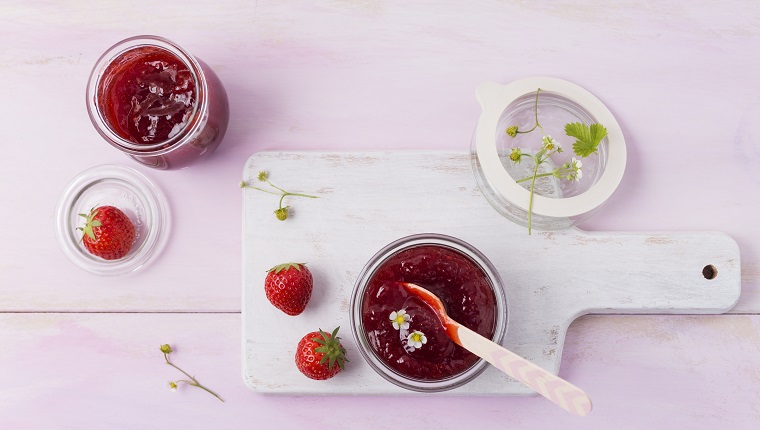Can dogs eat jelly? You may be asking this because you want to give your dog a taste of this sweet spread, or maybe your dog got into a jar of jelly and you’re worried about their health. Humans can eat jelly, so is it also safe for dogs to eat?
The short answer is no, jelly isn’t good for dogs to eat. Jelly is mostly sugar, which is not good for your dog in large amounts. Moreover, some sugar-free jellies may be toxic to dogs.
If your dog has eaten jelly, you should contact your veterinarian for guidance. Here’s why jelly isn’t good for dogs.
Why Is Jelly Bad For Dogs?
Jelly, like jam, is loaded with sugars that aren’t good for your doggo. Whether jelly is toxic to dogs depends on the fruit used to make the jelly. Grapes, for example, are toxic to dogs.
The difference between jelly and jam is the presence of fruit pulp in the latter. Because jelly only contains fruit juice, it may cause less of a reaction if it contains the juice of a fruit that is toxic to dogs. However, the sugar content is comparable.
Foods like jelly that are high in sugar content can cause severe health issues if eaten frequently or in large quantities. Your dog can develop diabetes, obesity, or heart issues from loads of jelly consumption. Because of this, it’s best to keep jelly away from your dog.
What Should I Do If My Dog Ate Jelly?

If your dog has eaten jelly, you should first determine if it contains real sugar or a sugar substitute. If it is the latter, check the ingredients to determine if the sugar substitute is xylitol.
Xylitol is a sugar substitute that is extremely toxic to dogs, even in small amounts. Take your dog to the vet as soon as possible if they consumed jelly with xylitol.
Additionally, if your dog has eaten jelly made from the juice of a fruit that is toxic to dogs, like grapes, you should contact your vet to determine the best course of action.
If you want your dog to reap the benefits of the fruit content of jelly, you should opt to feed them the fruit itself. Strawberries, blackberries, and blueberries are all safe for dog consumption, and most dogs like the natural sweetness of fruit without the added preservatives in jelly.






